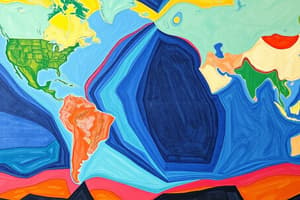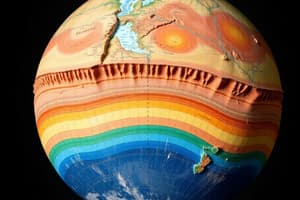Podcast
Questions and Answers
What does Plate Tectonic Theory describe about the Earth's lithosphere?
What does Plate Tectonic Theory describe about the Earth's lithosphere?
- It does not change over time.
- It is composed solely of oceanic crust.
- It is broken into plates that move slowly. (correct)
- It exists only in the upper mantle.
Which of the following events is explained by Plate Tectonic Theory?
Which of the following events is explained by Plate Tectonic Theory?
- Weathering of rocks
- Formation of glaciers
- Subduction (correct)
- Formation of deserts
Which types of plate boundaries are defined by Plate Tectonic Theory?
Which types of plate boundaries are defined by Plate Tectonic Theory?
- Convergent, devolving, and hybrid
- Subductive, transform, and divergent
- Divergent, concentric, and transform fault
- Convergent, divergent, and transform fault (correct)
What geologic feature is formed as a result of plate interactions at divergent boundaries?
What geologic feature is formed as a result of plate interactions at divergent boundaries?
Which of the following is least likely to occur at transform fault boundaries?
Which of the following is least likely to occur at transform fault boundaries?
What causes a convection current in the mantle?
What causes a convection current in the mantle?
Which term best describes the amount of material in a given volume of substance?
Which term best describes the amount of material in a given volume of substance?
Where do hot molten materials in a convection cell primarily rise?
Where do hot molten materials in a convection cell primarily rise?
What theory explains the movement of heavy plates at various boundaries?
What theory explains the movement of heavy plates at various boundaries?
What describes the motion of gas or liquid due to temperature variations?
What describes the motion of gas or liquid due to temperature variations?
What drives the motion of lithospheric plates at mid-ocean ridges?
What drives the motion of lithospheric plates at mid-ocean ridges?
What is the primary reason that lithospheric plates are able to move?
What is the primary reason that lithospheric plates are able to move?
In which layer do lithospheric plates flow?
In which layer do lithospheric plates flow?
How should you record your answers for the module activities?
How should you record your answers for the module activities?
Which of the following methods does NOT transfer heat?
Which of the following methods does NOT transfer heat?
Which of the following best describes the lithosphere?
Which of the following best describes the lithosphere?
Which of these is NOT considered a driving force for tectonic plate movement?
Which of these is NOT considered a driving force for tectonic plate movement?
What is the primary source of heat for mantle convection currents?
What is the primary source of heat for mantle convection currents?
Which process involves the rising and sinking of molten material due to density differences?
Which process involves the rising and sinking of molten material due to density differences?
What defines the mechanism of plate tectonics according to mantle convection?
What defines the mechanism of plate tectonics according to mantle convection?
Which phenomenon describes the formation of new oceanic crust as tectonic plates move apart?
Which phenomenon describes the formation of new oceanic crust as tectonic plates move apart?
What is the primary direction that hot materials move in a convection current?
What is the primary direction that hot materials move in a convection current?
Which process describes the motion of gas or liquid caused by differences in temperature?
Which process describes the motion of gas or liquid caused by differences in temperature?
Which of the following is not a geologic feature that occurs at plate boundaries?
Which of the following is not a geologic feature that occurs at plate boundaries?
In which layer of the Earth do convection currents occur?
In which layer of the Earth do convection currents occur?
At which type of boundary does the lithosphere uplift and tear apart due to rising hot magma?
At which type of boundary does the lithosphere uplift and tear apart due to rising hot magma?
Older oceanic crust at the subduction zone pushes down towards the:
Older oceanic crust at the subduction zone pushes down towards the:
What is the source of heat generated by the Earth's core that affects the mantle?
What is the source of heat generated by the Earth's core that affects the mantle?
Which type of boundary is associated with horizontal slip that doesn't involve uplift or subduction?
Which type of boundary is associated with horizontal slip that doesn't involve uplift or subduction?
What process leads to the movement of lithospheric plates due to the rising and cooling of materials in the mantle?
What process leads to the movement of lithospheric plates due to the rising and cooling of materials in the mantle?
Which force involves the pull of a heavier subducting plate on the trailing slab into the subduction zone?
Which force involves the pull of a heavier subducting plate on the trailing slab into the subduction zone?
What happens at a convergent boundary due to the movement of magma?
What happens at a convergent boundary due to the movement of magma?
During convection, what factors cause the heat transfer process?
During convection, what factors cause the heat transfer process?
How does ridge push affect the movement of lithospheric plates?
How does ridge push affect the movement of lithospheric plates?
Which of the following best describes the asthenosphere?
Which of the following best describes the asthenosphere?
What is a common result of hot material rising and cooler material sinking in the mantle?
What is a common result of hot material rising and cooler material sinking in the mantle?
What is the effect of the old oceanic crust becoming heavier than the new oceanic crust?
What is the effect of the old oceanic crust becoming heavier than the new oceanic crust?
What role do convection currents play within the Earth's mantle?
What role do convection currents play within the Earth's mantle?
Which of the following is a source of information about convection currents?
Which of the following is a source of information about convection currents?
What kind of document is likely to discuss the Theory of Plate Tectonics?
What kind of document is likely to discuss the Theory of Plate Tectonics?
Which of the following educational institutions has published a document related to convection currents?
Which of the following educational institutions has published a document related to convection currents?
What is one of the primary services offered by the Bureau of Learning Resources?
What is one of the primary services offered by the Bureau of Learning Resources?
Which of the following links could provide a PDF on plate tectonics?
Which of the following links could provide a PDF on plate tectonics?
From which of the following platforms can one access information on the Theory of Plate Tectonics?
From which of the following platforms can one access information on the Theory of Plate Tectonics?
What is the primary focus of the sources listed in the content?
What is the primary focus of the sources listed in the content?
Flashcards are hidden until you start studying
Study Notes
Plate Tectonic Theory
- Developed in the 1960s, revolutionizing geology and understanding Earth's dynamics.
- Describes the lithosphere, which includes the crust and upper mantle, as being divided into several rigid plates.
- These tectonic plates move very slowly across the Earth's surface.
Types of Plate Boundaries
- Convergent Boundaries: Plates collide, leading to geological phenomena such as mountain formation and subduction zones.
- Divergent Boundaries: Plates move apart, creating new crust and often associated with volcanic activity.
- Transform Fault Boundaries: Plates slide past each other, primarily causing earthquakes.
Geological Events and Features
- Earthquakes occur due to the friction and stress at plate boundaries, especially at transform faults.
- Subduction occurs when one plate sinks below another, creating deep ocean trenches and leading to volcanic activity.
- The formation of mountains often results from the collision of tectonic plates at convergent boundaries.
- Volcanoes typically form at divergent boundaries and subduction zones, where magma rises to the surface.
Module Overview
- Assess understanding through post-tests provided at the end of each module.
- Answer keys are included to promote honesty in self-assessment.
- Facilitators have additional notes for guiding home-based learning.
- Use a separate paper for exercises and read instructions carefully.
- Consult teachers or facilitators for assistance if needed.
Lithosphere and Plate Tectonics
- Earth’s lithosphere consists of rigid sections known as tectonic plates that are in constant motion.
- Lithospheric plate movement is driven by thermal convection in the mantle.
- Objectives include describing causes of plate movement and recognizing convection currents in the mantle.
Convection Current Concepts
- Convection currents occur due to temperature differences, leading to variations in density.
- Hot molten materials in convection cells rise, while cooler, denser materials sink, creating cyclical movement.
- The process of convection in the mantle is a significant driver of lithospheric plate motion.
Continental Drift Theory
- Proposed by Alfred Wegener, suggesting continents were once part of a supercontinent called Pangaea.
- Evidence for this theory includes geological similarities and fossil distribution across continents.
- The theory of seafloor spreading provides additional support for plate tectonics.
Mantle Convection Mechanics
- The asthenosphere is the semi-fluid layer beneath the lithosphere, allowing plate movement.
- Mantle convection includes rising and sinking materials, forming convection cells.
- Forces acting on lithospheric plates:
- Slab pull: Heavier subducting plates drag trailing plates into subduction zones.
- Ridge push: Uplift of mantle causes oceanic crust to slide downward at mid-ocean ridges.
Heat Transfer and Tectonic Activity
- Heat transfer in the mantle results from convection, influenced by temperature and density differences.
- Various geological features occur at plate boundaries, including volcanoes, mountains, and trenches.
- Understanding mantle convection is critical to grasping the mechanisms of tectonic plate dynamics.
Assessment Activities
- Activities designed to reinforce learning on convection processes.
- Students are required to illustrate convection processes through various assignments.
- The creation of a Mantle Convection Infographic synthesizes understanding of convection currents and their causes.
Additional Learning Resources
- Utilize printed and electronic materials to enhance understanding.
- Encourage the exploration of external sources for a more comprehensive grasp of plate tectonics and convection currents.
Studying That Suits You
Use AI to generate personalized quizzes and flashcards to suit your learning preferences.




